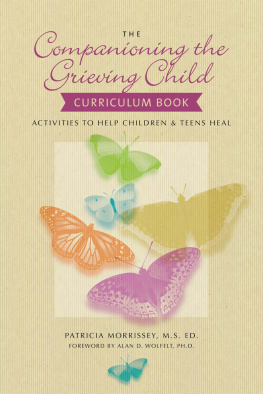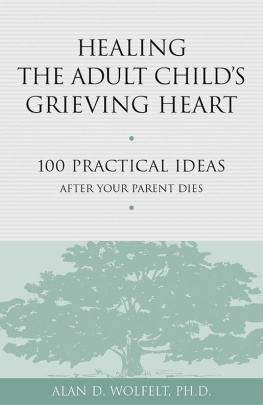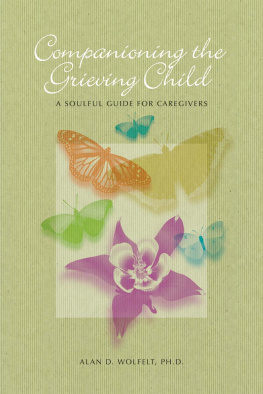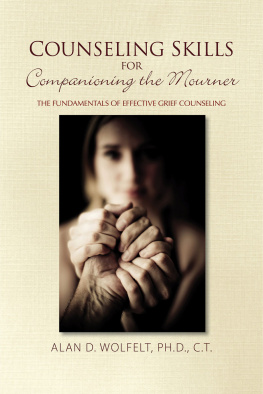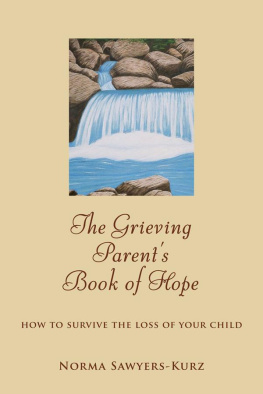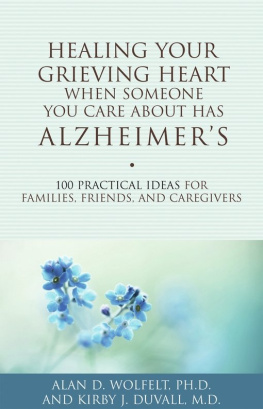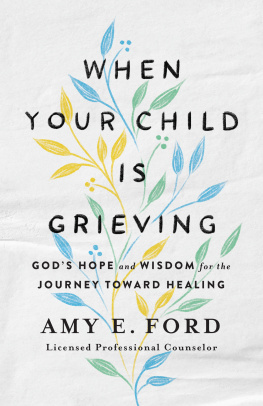Companion Press is dedicated to the education and support of both the bereaved and breavement caregivers. We believe that those who companion the bereaved by walking with them as they journey in grief have a wonderous opportunity: to help others embrace and grow through griefand to lead fuller, more deeply lived lives themselves because of this important ministry.
For a complete catalog and ordering information, write or call or visit our website.
 | Companion Press
The Center for Loss and Life Transition |
| 3735 Broken Bow Road | Fort Collins, CO 80526 |
| Phone: (970) 226-6050 | Fax: 1-800-922-6051 |
2013 by Patricia Morrissey, M.S. Ed. and Alan D. Wolfelt, Ph.D.
All rights reserved. No part of this publication may be reproduced, stored in a retrieval system, or transmitted in any form or by any means, electronic, mechanical, photocopying, recording or otherwise, without the prior permission of the publisher.
Companion Press is an imprint of the Center for Loss and Life Transition
3735 Broken Bow Road, Fort Collins, CO 80526
(970) 226-6050
www.centerforloss.com
Companion Press books may be purchased in bulk for sale promotions, premiums, or fundraisers. Please contact the publisher at the above address for more information.
Printed in the United States of America
18 17 16 15 14 13 5 4 3 2 1
ISBN 978-1-61722-185-9
To my sister, Mimi, and her children, Liz, Arran, and Sean.
In 1994, Mimi and my nieces and nephew experienced the sudden death of their husband and father, Bob Burpee.
Their strength, wisdom, and courage taught me so much about the journey of grief.
Contents
Foreword
There is no ministry more important than companioning grieving children.

Receiving and accepting help from others is essential for all of us when we are in mourning, but grieving children and teens especially need and deserve our compassionate support. As with so many other things in their young lives, their early experiences with death and grief will teach them the rules of mourning. Is it acceptable to show others their sadness? If theyre angry, will they get in trouble? Is it OK to openly ask all the questions roiling inside them?
In our mourning-avoidant culture, too often children and teens are taught to deny or repress their grief. Thank goodness for compassionate grief companions like Pat Morrissey and you. With your help, grieving children and teens can learn the truth: that grief is a normal and necessary process, and that healing and a life bursting with love are made possible by open and honest mourning.
The activities in this wonderful curriculum are designed for childrens and teens grief group leaders to use in their meetings. When we are grieving, all of usadults includedbenefit from doing something with our thoughts and feelings. Words are often inadequate when it comes to death and loss, so activities that engage our bodies and brains in ritual or play give us a structure for expressing ourselves. Kids, especially, respond to play and are more likely to communicate (through behaviors as well as words) while they are engaged in a game or art.
Youll note that the curriculum activities are structured around my concept of the six needs of mourning. As grief companions, our job description is anchored, in part, in creating hospitality for children to dose themselves on these six needs. The activities provide focused opportunities to do just that.
As you work with the grieving children in your care, I encourage you to observe as much as facilitate the activities. The companioning model of grief care, which I created some years ago, is anchored in a teach me perspective. It is about learning and observing. In fact, the meaning of observance comes to us from ritual. It means not only to watch out for but also to keep and honor, or to bear witness. The caregivers awareness of this need to learn is the essence of true companioning.
Because, as Pat reminds us throughout this book, the activities themselves are not the primary purpose of each group meeting. They are but a means to an end. Always the most important goal is to create a safe place in which kids can express their grief and connect with one another. So bear witness to what is happening to the children as you work on an activity. Let them teach you what they want to do and talk about. The activity is simply a doorway. If you let them, they will create what is on the other side of that doorway with only minimal guidance from you.
Children are resilient, people often say. In my work with hundreds of grieving children and as a father to my own three kids, I have seen that is true. But if they arent guided by supportive adults who teach them what it means to openly and honestly mourn, too often their natural resilience walls in their grief. They keep their chins up and are strong on the outside, all the while hiding the painful, tender truth of their grief on the inside.
Thank you for being a companion to grieving children and teens. I am humbled by your devotion to creating safe places for kids to mourn. The world needs more of you.

Acknowledgments
Thank you from the bottom of my heart to all of you who have contributed to the development of The Companioning the Grieving Child Curriculum Book. Writing this book has been such a fulfilling project, especially the portions that deal with relating the experience of the death to a context of meaning. My understanding of this spiritual realm of death has grown tremendously.

Blessings to my sister, Mimi, whose husband died at age 42 in 1994, leaving her with three children, Liz (11), Arran (9), and Sean (7). From the beginning of this tragic death and through all these years, each of you has modeled your journey of grief with an internal source of strength and found meaning, purpose, and the ability to live and love life fully again. Thank you for your commendable fortitude, courage, support of each other, and inspiration. Also much appreciation for introducing me to Eles Place, where they opened their hearts to you and your family and opened my eyes to the power of a grief center.
A huge note of gratitude to Alan Wolfelt for his compassionate words and books about companioning the bereaved. Thank you, especially, for endorsing my work and this book.
Thank you to MargaretAnns Place in Milwaukee for teaching me so much about children and grief. Through your mentorship and my experience, I learned so much about the importance of a structured grief curriculum. A special acknowledgment to Debra Smith-Anderson, Ginger Heigl, and Nichole Schwerman for your time, resources, and education.
I so appreciate the Southeast Wisconsin Grief Network, whose mission is to support and companion the bereaved and the community through their representation of hospitals, hospices, grief centers, churches, and funeral homes. They model leadership for those who companion the bereaved through education, care, and compassion.
The families and volunteers at Mourning Cloak are always dear to my heart. To the volunteers, a sincere thank you for your continual support of our grieving families and for always opening up your hearts. For our families, you continually amaze me with your courage, fortitude, and openness. I have learned so much from each of you.
Next page
